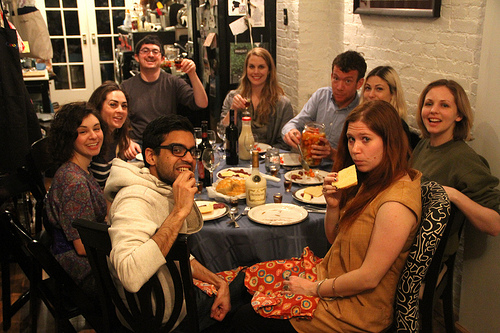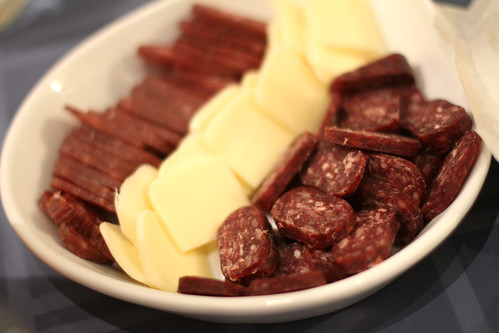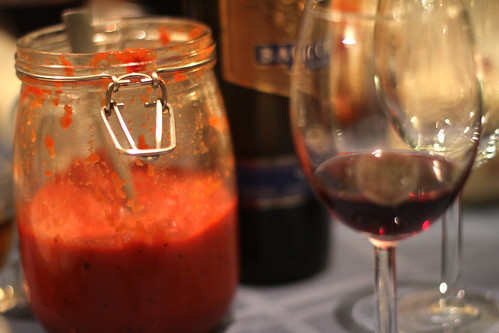Meal 26: Bulgaria
 Since we took a break last weekend, I thought I'd be smart and get a head start on Bulgarian shopping and get some exercise in the meanwhile. So I hopped on my bike and rode nearly nine miles to Brighton Beach, only to discover that while it's the place to go for Russian, Ukrainian, and even Georgian food, they just don't have Bulgarian there. When I asked for lukanka, a type of dry-cured sausage, the kind lady at a deli said, "Oh, you have to go to Astoria, Queens, that's the only place." So I rode the Q train two stops short the entire distance, and found virtually everything on my shopping list including Bulgarian-style yogurt and, yes, lukanka.
Since we took a break last weekend, I thought I'd be smart and get a head start on Bulgarian shopping and get some exercise in the meanwhile. So I hopped on my bike and rode nearly nine miles to Brighton Beach, only to discover that while it's the place to go for Russian, Ukrainian, and even Georgian food, they just don't have Bulgarian there. When I asked for lukanka, a type of dry-cured sausage, the kind lady at a deli said, "Oh, you have to go to Astoria, Queens, that's the only place." So I rode the Q train two stops short the entire distance, and found virtually everything on my shopping list including Bulgarian-style yogurt and, yes, lukanka.
Thanks to this head start, I made both the pickled vegetables and the millet beer well ahead of time. The rest of the dishes were either simple to whip up in advance, or took a long time in the oven — no short-order prep here! So for the first time in 26 meals, I wasn't scurrying when guests arrived. And I was glad to have plenty of time to get to know them, since six were brand new to United Noshes: Melanie, Angad, Phia, Rachael, Noah, and Kara. Kirsty and Jessica, two frequent noshers, rounded out the table.
We should also note that between brandy, beer, and wine, and the rockin' tunes, we had quite a fun Saturday evening.
Lukanka, sujuk, kashkaval | Cured sausage and cheese

These two salami-like, dry-cured sausages were really tasty. The sujuk had a good rich meaty flavor, while the lukanka had a great cumin tone. The name for the semi-firm, mildly flavored kashkaval cheese presumably comes from the Italian caciocavallo, and while it's a well known and enjoyed cheese in Bulgaria, it definitely plays second fiddle to sirene, or what we know as feta.
Lyutenitza | Pepper and tomato relish | Recipe

Similar to the ajvar we enjoyed for Bosnia, but this time I made a lot less of it and also cut out the eggplant, and instead added a chili pepper. For flavor and fun, I flame-roasted the peppers on the stovetop. Note that instead of grinding up some lame winter tomatoes, I just used some canned tomato puree.
Trushia | Pickled vegetables | Recipe

In the olden days, if you wanted vegetables throughout the winter, you had to pickle them. The quantities in the recipes I found for both trushia and lyutenitza were both enormous — all that you see in the jar above is less than half of what was called for. Also, despite my feeling clever for having started a whole week beforehand, a true trushia takes a few weeks to set in, so this was more of a quick pickle, with sugar in addition to the standard vinegar and salt. I also added some bay, thyme, and black pepper as I'd seen suggested in other recipes. It was tasty and popular, in fact by the end of the meal there was hardly any left.
Tradicionna pitka | Egg bread | Recipe

I'm really sorry that this recipe takes forever to load, it's a huge file off a slow server. Anyway, this pretty bread is loaded with eggs and butter. The recipe wasn't clear on how much yeast was required, so I used a standard packet's worth and it seemed to work OK. However, maybe I should have added more sugar, because for all the rich ingredients it still wasn't incredibly flavorful. Or maybe that's how it should be? Anyway, it looked pretty and it all disappeared so I guess I shouldn't be too disappointed.
Boza | Millet beer | Recipe

After my success in making ginger beer for Barbados, I tried my hand at making this sweet, almost milky, low-alcohol homebrew. Although you're supposed to use a cup of boza to start the next batch of boza, since I had none to begin with I used my sourdough starter to kick it off. And lo and behold, it worked: after three days I had a rich, fizzy drink that was at once comforting and strange. Consensus around the table was that it was worth a few sips but wasn't incredibly quaffable. That hesitation may have come from the legend that I've read in a few places that consuming boza leads to larger breasts — supposedly the lactic acid stimulates them, but that sounds pretty suspect. Also, after sitting out of the fridge for about a half hour, one of the bottles suddenly had its cork fly out. It's alive!!
Shopska salata | Peasant salad with cheese | Recipe

This recipe begins with what is quite possibly the most ridiculous homage to a salad I've ever read:
May we say that it is an ancient invention and one of fundamental importance for civilization, although it is not mentioned in any encyclopaedia. Certainly, it is as important as the invention of the wheel and the use of fire. Shopska is beautiful, tasty, juicy, piquant, and flavoury. It is like Nature - indescribable.... It may be served as a single meal, as the first dish, together with the main dish, after meal, or just as a snack. You can offer it to your guests by way of welcome. You can serve it by way of goodbye.
It was indeed tasty, but lest you get all worked up, just realize that this is a minor variation of what you probably know of as a Greek salad. (But don't tell a Bulgarian that!) And despite the above description, at least one source implies that the salad was invented about fifty years ago.
Tarator | Cold yogurt-cucumber soup | Recipe

Bulgaria's most famous food is yogurt. I've not yet had the fortune of eating yogurt in Bulgaria, but hands down my favorite type of yogurt is the Bulgarian style. It's thicker than most, but not strained like Greek yogurt, and has both depth of flavor and a fantastic tanginess. Pretty much any culture that makes yogurt seems to have figured out that it goes great with cucumbers and garlic — from the Greek tzatziki, to the Indian raita, and even the Afghan drink known as dough (careful readers of this blog from the beginning will remember to pronounce it in the Klingon style) — yet this famous cold soup makes one very subtle yet interesting tweak: just a few crushed walnuts add a soupçon of depth and woodiness to contrast the tang and crisp of the other ingredients. It was lovely, yet I bet it's a true godsend when it's hot out.
Kapama | Meat and sauerkraut casserole | Recipe

This dish has just about everything: blood sausage, veal, chicken, smoked bacon, and pork, all interlaced with sauerkraut and rice. It's shockingly easy to make, just cut up all the meat, layer it, and bake for four hours. If you like meat, and are extremely hungry, this is quite a treat.
Tutmanik | Feta-stuffed bread | Recipe

I made this with the second half of the dough for the pitka above. It was pretty fun to make: you roll out the dough, sprinkle with feta, fold in the corners, flip it over, and roll and repeat three more times to make all sorts of layers of cheese. It was pretty, though the flavor was a bit lacking. I'd like to try this technique sometime and add a few different ingredients, maybe spinach or feta or sausage.
Tikvenik | Pumpkin-walnut filo pastry | Recipe

Banitsa is the catch-all word for pastry; even the tutmanik cheese bread gets wrapped into that category. But to pay homage to the filo-based core of this genre, and also to try something a little novel for dessert, I made this little filo rollups with shredded pumpkin, walnuts, and cinnamon inside. It was a bit of a mindbender, since it looks and crackles like baklava, but is not nearly as sweet and has a much more complex flavor.
Throughout the meal, we enjoyed a variety of Bulgarian music, which pleasantly surprised us with its Middle East-style pop tunes (read up on chalga) and gorgeous choral harmonies. If you have Spotify, it's well worth a listen to the playlist.
Six of our next seven meals are from Africa. We dive into things with Burundi next week!
Photos by Laura Hadden.